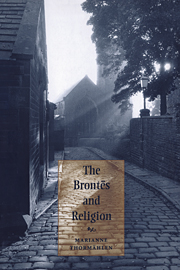Book contents
- Frontmatter
- Contents
- Acknowledgements
- Abbreviations and editions
- Introduction
- I Denominations
- Chapter 1 A Christian home in early nineteenth-century England: Evangelicalism, Dissent and the Brontë family
- Chapter 2 Charlotte Brontë and the Church of Rome
- Chapter 3 An undenominational temper
- II Doctrines
- III Ethics
- IV Clerics
- Notes
- Select bibliography
- Index
Chapter 2 - Charlotte Brontë and the Church of Rome
Published online by Cambridge University Press: 22 September 2009
- Frontmatter
- Contents
- Acknowledgements
- Abbreviations and editions
- Introduction
- I Denominations
- Chapter 1 A Christian home in early nineteenth-century England: Evangelicalism, Dissent and the Brontë family
- Chapter 2 Charlotte Brontë and the Church of Rome
- Chapter 3 An undenominational temper
- II Doctrines
- III Ethics
- IV Clerics
- Notes
- Select bibliography
- Index
Summary
Although the Brontës, father and children, took a lively interest in the continuous bickering between and among Church of England representatives and various kinds of Dissent, occasionally contributing to it themselves, the tone of their polemics is comparatively light. Doctrinal disputes are usually conducted with irony rather than heat. As was pointed out above, one often has a feeling that what the Brontë sisters object to in Nonconformists is silly or unseemly behaviour rather than fundamental, and potentially dangerous, errors. But when the focus shifts from fellow Protestants – however personally irksome and religiously misguided – to Roman Catholics, a different note creeps in. Charlotte Brontë's fiction, especially Villette, evinces a degree of hostility to the Church of Rome which has grated on many readers. It was a little hard to stomach even for a few of her contemporaries, especially High-Church Anglicans and free-thinkers; and in modern times (with their readiness to stigmatise anyone who expresses public disapproval of a religious denomination other than the Established Church) she has often been condemned as intolerant and bigoted. It is the purpose of this chapter to clarify the diverse factors which bred and conditioned that hostility, looking at the particularities of its textual manifestations in the process.
First of all, though, it should be observed that simple biographical circumstances made it more natural for Charlotte to engage with ‘Romanism’ than it would have been for either of her sisters.
- Type
- Chapter
- Information
- The Brontës and Religion , pp. 24 - 38Publisher: Cambridge University PressPrint publication year: 1999



